新概念一册lesson 143
- 格式:ppt
- 大小:13.10 MB
- 文档页数:70
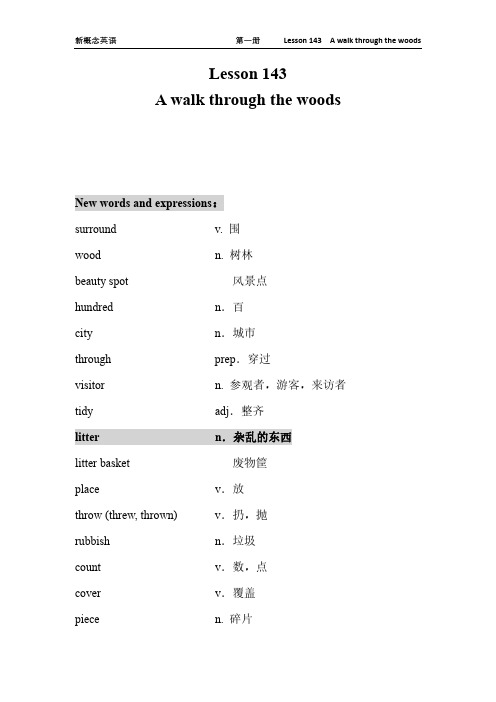
Lesson 143A walk through the woodsNew words and expressions:surround v. 围wood n. 树林beauty spot风景点hundred n.百city n.城市through prep.穿过visitor n. 参观者,游客,来访者tidy adj.整齐litter n.杂乱的东西litter basket废物筐place v.放throw (threw, thrown) v.扔,抛rubbish n.垃圾count v.数,点cover v.覆盖piece n. 碎片tyre n.轮胎rusty adj.生锈的among prep.在…之间prosecute v. 依法处置surround v. 包围surround + n.eg. The wall surrounds the jail. 那所监狱四周都是围墙。
Surrounding adj. 周围的,附近的the surrounding scenery 四周的风景surrounding n.环境,周围的事物eg. I'd like to bring up my child in healthy surrounding.我想在健康的环境中养育我孩子。
wood1)n.森林,树林(通常比forest小)eg. She got lost in the woods. 她在森林中迷路了。
2)n.木材,木料eg. This house is made of wood. 这栋房子是木造的。
beauty spot景点,风景胜地beauty n. 美beauty queen 选美赛中的第一名beauty contest 选美会(比赛)a woman of great beauty 很美的女子manly beauty男性美womanly beauty 女性美eg. Beauty is but only skin-deep.(谚)美貌只在外表,人不可以貌相。
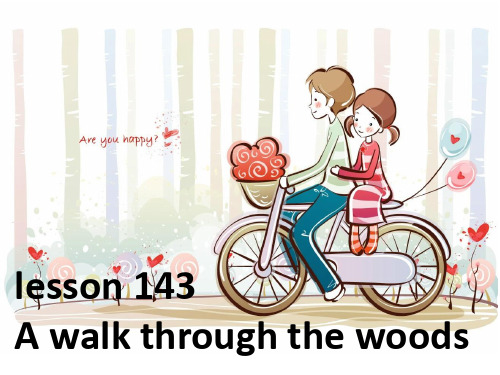
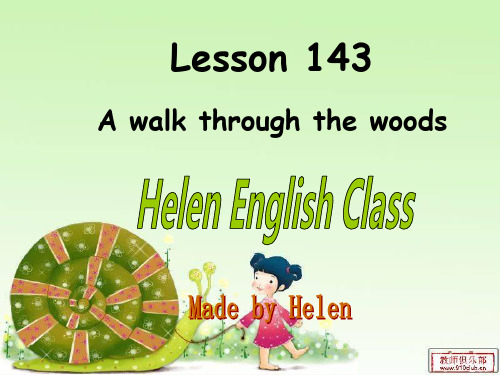
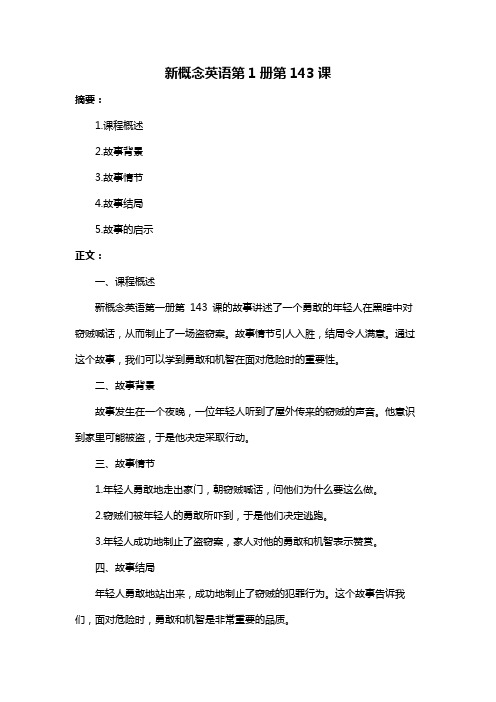
新概念英语第1册第143课
摘要:
1.课程概述
2.故事背景
3.故事情节
4.故事结局
5.故事的启示
正文:
一、课程概述
新概念英语第一册第143 课的故事讲述了一个勇敢的年轻人在黑暗中对窃贼喊话,从而制止了一场盗窃案。
故事情节引人入胜,结局令人满意。
通过这个故事,我们可以学到勇敢和机智在面对危险时的重要性。
二、故事背景
故事发生在一个夜晚,一位年轻人听到了屋外传来的窃贼的声音。
他意识到家里可能被盗,于是他决定采取行动。
三、故事情节
1.年轻人勇敢地走出家门,朝窃贼喊话,问他们为什么要这么做。
2.窃贼们被年轻人的勇敢所吓到,于是他们决定逃跑。
3.年轻人成功地制止了盗窃案,家人对他的勇敢和机智表示赞赏。
四、故事结局
年轻人勇敢地站出来,成功地制止了窃贼的犯罪行为。
这个故事告诉我们,面对危险时,勇敢和机智是非常重要的品质。
五、故事的启示
这个故事启示我们要勇敢面对危险,用智慧去解决问题。
在现实生活中,我们也会遇到各种各样的困难和挑战。
我们应该像这位年轻人一样,勇敢地迎接挑战,用我们的智慧去解决问题。
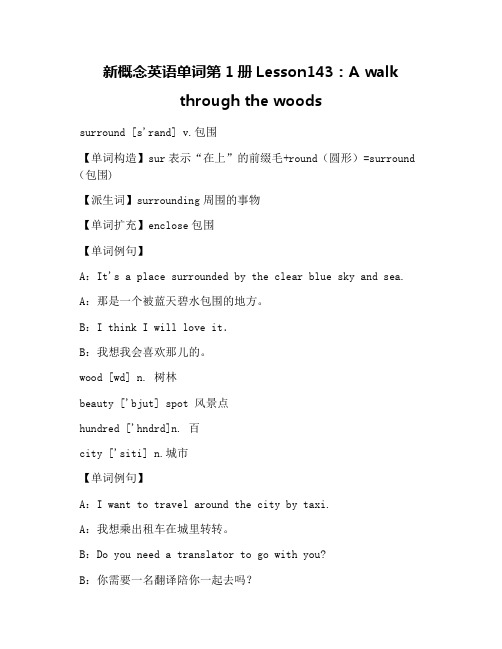
新概念英语单词第1册Lesson143:A walkthrough the woodssurround [s'rand] v.包围【单词构造】sur表示“在上”的前缀毛+round(圆形)=surround (包围)【派生词】surrounding周围的事物【单词扩充】enclose包围【单词例句】A:It's a place surrounded by the clear blue sky and sea.A:那是一个被蓝天碧水包围的地方。
B:I think I will love it.B:我想我会喜欢那儿的。
wood [wd] n. 树林beauty ['bjut] spot 风景点hundred ['hndrd]n. 百city ['siti] n.城市【单词例句】A:I want to travel around the city by taxi.A:我想乘出租车在城里转转。
B:Do you need a translator to go with you?B:你需要一名翻译陪你一起去吗?through [θru] prep.穿过【派生词】throughout贯穿【单词搭配】pass through穿过【单词例句】A:Pull over.You went through a red light.A:靠边,你闯红灯了。
B:Sorry,I didn't notice it.B:对不起,我没有注意到。
visitor ['vzt]n.参观者,游客;来访者【单词例句】A:They can make the visitors laugh every time.A:它们每次总能使游人捧腹大笑。
B:How do they make it?B:它们是怎么做到的?tidy ['taidi] adj.整齐的litter ['lt] n. 杂乱的东西litter basket 废物筐place [ples] v.放【单词扩充】put放【单词搭配】take place发生 take the place of代替 in place of代替【单词例句】A:Where do you think we can place the table?A:你认为我们把这张桌子放在哪儿好昵?B:Let me think about it first.B:我先想想。
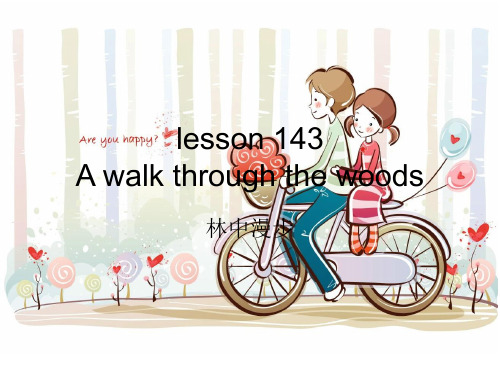
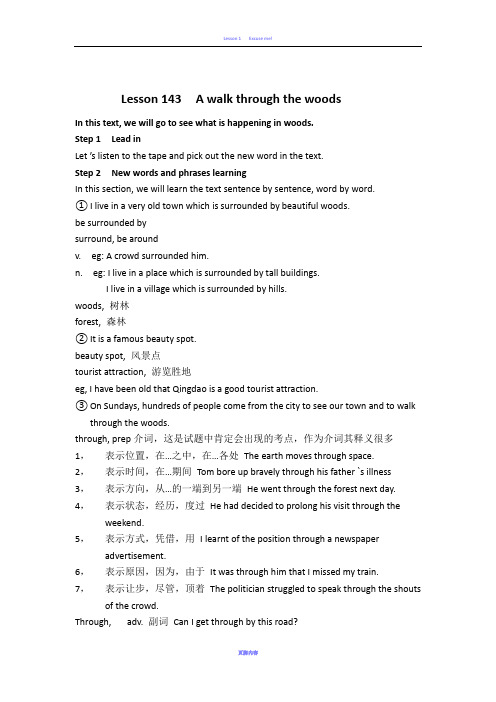
Lesson 143 A walk through the woodsIn this text, we will go to see what is happening in woods.Step 1 Lead inLet ’s listen to the tape and pick out the new word in the text.Step 2 New words and phrases learningIn this section, we will learn the text sentence by sentence, word by word.①I live in a very old town which is surrounded by beautiful woods.be surrounded bysurround, be aroundv. eg: A crowd surrounded him.n. eg: I live in a place which is surrounded by tall buildings.I live in a village which is surrounded by hills.woods, 树林forest, 森林②It is a famous beauty spot.beauty spot, 风景点tourist attraction, 游览胜地eg, I have been old that Qingdao is a good tourist attraction.③On Sundays, hundreds of people come from the city to see our town and to walkthrough the woods.through, prep介词,这是试题中肯定会出现的考点,作为介词其释义很多1,表示位置,在…之中,在…各处The earth moves through space.2,表示时间,在…期间Tom bore up bravely through his father `s illness3,表示方向,从…的一端到另一端He went through the forest next day.4,表示状态,经历,度过He had decided to prolong his visit through the weekend.5,表示方式,凭借,用I learnt of the position through a newspaper advertisement.6,表示原因,因为,由于It was through him that I missed my train.7,表示让步,尽管,顶着The politician struggled to speak through the shouts of the crowd.Through, adv. 副词Can I get through by this road?adj.形容词through traffic④Visitors have been asked o keep the woods clean and tidyHave been asked 现在完成时的被动语态⑤Litter baskets have been placed under the trees, but people still throw theirrubbish everywhere.have been placed现在完成时的被动语态被动语态的基本构成是be+过去分词,体现在现在完成时中,根据人称的不同be 变化成has/have been+过去分词再看一下文章的最后一句:Anyone who leaves litter in these woods will be prosecuted.will be prosecuted 一般将来时的被动语态在一般将来时中,be要变化成will be+过去分词Eg. The rooms haven ’t been cleaned yet.They will be clean soon.I have never been asked to do things I don ’t like.You will be asked to show your passport at the customs office⑥Last Wednesday, I went for a walk in the woods.go for a walk=take a walkeg. I ’ll go out and take a walk in the park=I ’ll go out for a walk in the park.⑦What I saw made me very sad.make sb. + adj 让人感觉…样make him happy make her satisfied⑧I counted seven old cars and three old refrigerators.refrigerator=fridge⑨The litter baskets were empty and the ground was covered with pieces of paper,cigarette ends, old tyres, empty bottles and rusty tins.litter n. 本文中的意思是,废弃物、垃圾eg, The street was full of litter.n. 杂乱,凌乱eg, Her room was in such a litter that she was ashamed to ask me in.v. 使杂乱,乱丢杂物eg, Don ’t litter!be covered witheg, The furniture is covered with dust.The road is covered with snow.rusty adj. 生锈的eg, The knife got rusty.引申义,荒疏的My English is getting rusty.⑩Among the rubbish, I found a sign which said, ‘ Anyone who leaves litter in these woods will be prosecuted!’said 需要表示写着时,英语里不用writeeg, The book doesn’t say where he was born.The clock says three o’clock.prosecute v. 检举告发某人对某人提起控诉eg,He was prosecuted for theft.Step 3 Free TalkingTopic:What should we do with the rubbish in our daily life?What should we do, if we go to climb mountain and there is no rubbish basket. What will happen if we throw the rubbish everywhere in the woods?Step 4 Homework观察身边的包装,看看有什么包装上标示着类似Don’t litter!这样的提示语,并记住这些商品的英文怎么说,我们下节课一起来学习一下。
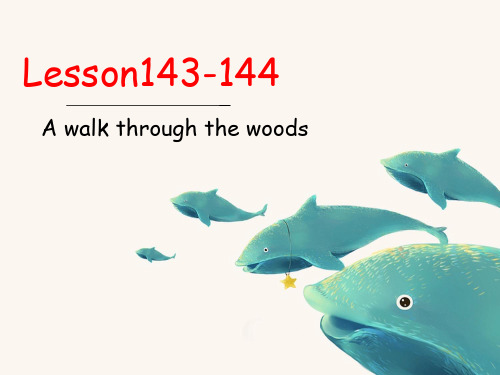

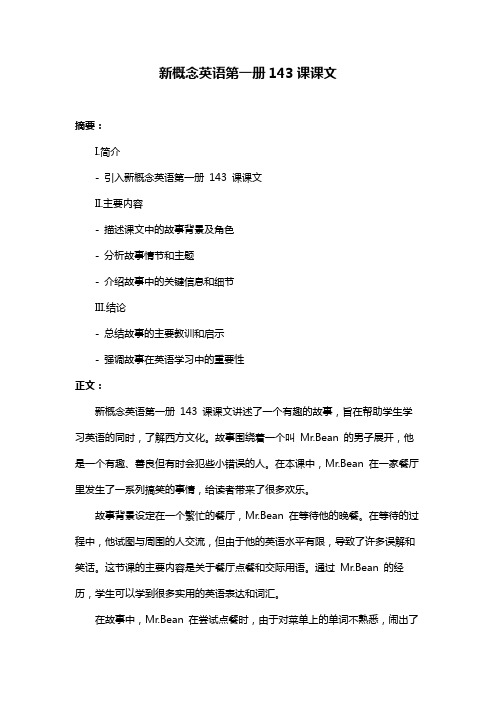
新概念英语第一册143课课文摘要:I.简介- 引入新概念英语第一册143 课课文II.主要内容- 描述课文中的故事背景及角色- 分析故事情节和主题- 介绍故事中的关键信息和细节III.结论- 总结故事的主要教训和启示- 强调故事在英语学习中的重要性正文:新概念英语第一册143 课课文讲述了一个有趣的故事,旨在帮助学生学习英语的同时,了解西方文化。
故事围绕着一个叫Mr.Bean 的男子展开,他是一个有趣、善良但有时会犯些小错误的人。
在本课中,Mr.Bean 在一家餐厅里发生了一系列搞笑的事情,给读者带来了很多欢乐。
故事背景设定在一个繁忙的餐厅,Mr.Bean 在等待他的晚餐。
在等待的过程中,他试图与周围的人交流,但由于他的英语水平有限,导致了许多误解和笑话。
这节课的主要内容是关于餐厅点餐和交际用语。
通过Mr.Bean 的经历,学生可以学到很多实用的英语表达和词汇。
在故事中,Mr.Bean 在尝试点餐时,由于对菜单上的单词不熟悉,闹出了很多笑话。
例如,他误将“水”翻译成“鱼”,引起了周围人的嘲笑。
然而,他并没有因此而气馁,继续尝试用英语与他人交流。
最终,在一位好心女士的帮助下,他成功地点了餐并解决了误会。
通过这个故事,学生可以学到很多实用的英语表达和句型,如询问价格、表达歉意、感谢他人等。
此外,故事还传达了积极向上的信息,鼓励学生在学习英语的过程中,不怕犯错,勇于尝试。
总之,新概念英语第一册143 课课文是一篇富有趣味性和教育意义的文章。
通过学习这篇课文,学生不仅可以提高自己的英语水平,还能了解西方文化,开阔视野。
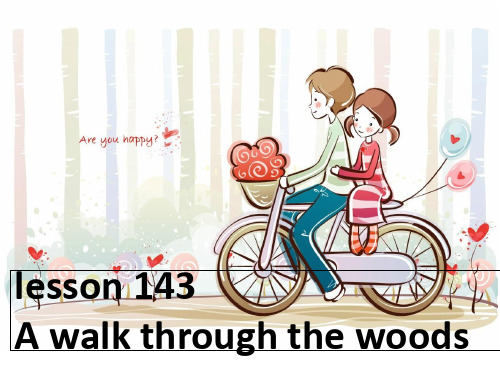
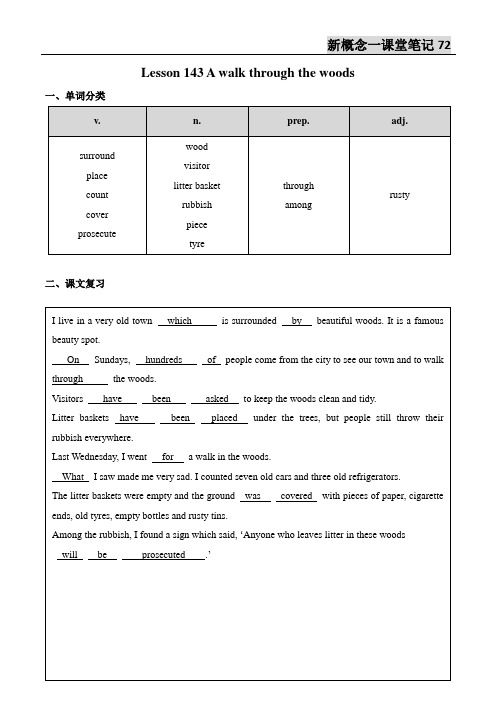
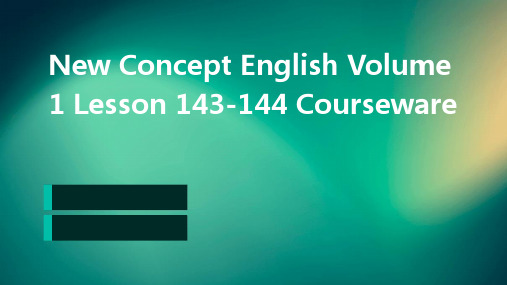
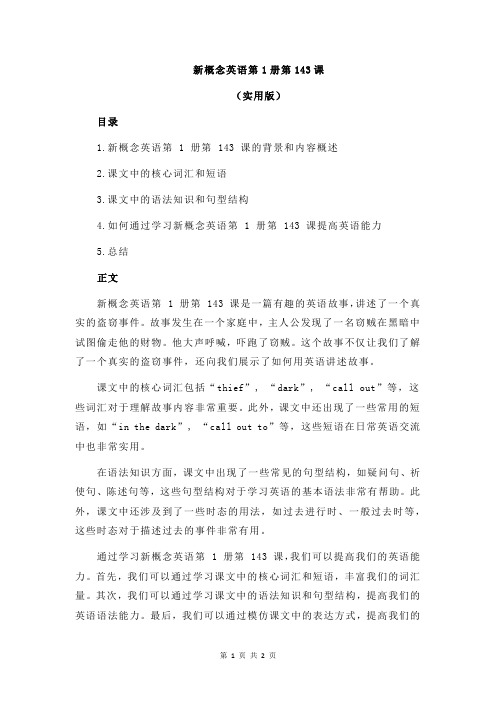
新概念英语第1册第143课
(实用版)
目录
1.新概念英语第 1 册第 143 课的背景和内容概述
2.课文中的核心词汇和短语
3.课文中的语法知识和句型结构
4.如何通过学习新概念英语第 1 册第 143 课提高英语能力
5.总结
正文
新概念英语第 1 册第 143 课是一篇有趣的英语故事,讲述了一个真实的盗窃事件。
故事发生在一个家庭中,主人公发现了一名窃贼在黑暗中试图偷走他的财物。
他大声呼喊,吓跑了窃贼。
这个故事不仅让我们了解了一个真实的盗窃事件,还向我们展示了如何用英语讲述故事。
课文中的核心词汇包括“thief”, “dark”, “call out”等,这些词汇对于理解故事内容非常重要。
此外,课文中还出现了一些常用的短语,如“in the dark”, “call out to”等,这些短语在日常英语交流中也非常实用。
在语法知识方面,课文中出现了一些常见的句型结构,如疑问句、祈使句、陈述句等,这些句型结构对于学习英语的基本语法非常有帮助。
此外,课文中还涉及到了一些时态的用法,如过去进行时、一般过去时等,这些时态对于描述过去的事件非常有用。
通过学习新概念英语第 1 册第 143 课,我们可以提高我们的英语能力。
首先,我们可以通过学习课文中的核心词汇和短语,丰富我们的词汇量。
其次,我们可以通过学习课文中的语法知识和句型结构,提高我们的英语语法能力。
最后,我们可以通过模仿课文中的表达方式,提高我们的
英语表达能力。
总结起来,新概念英语第 1 册第 143 课是一篇非常有趣的英语故事,通过学习这篇课文,我们可以提高我们的英语能力。
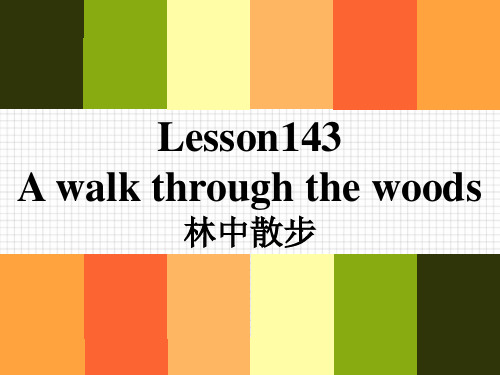
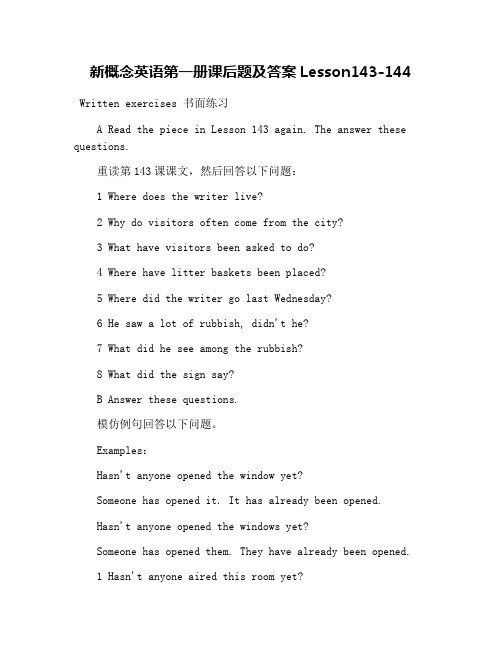
新概念英语第一册课后题及答案Lesson143-144 Written exercises 书面练习A Read the piece in Lesson 143 again. The answer these questions.重读第143课课文,然后回答以下问题:1 Where does the writer live?2 Why do visitors often come from the city?3 What have visitors been asked to do?4 Where have litter baskets been placed?5 Where did the writer go last Wednesday?6 He saw a lot of rubbish, didn't he?7 What did he see among the rubbish?8 What did the sign say?B Answer these questions.模仿例句回答以下问题。
Examples:Hasn't anyone opened the window yet?Someone has opened it. It has already been opened.Hasn't anyone opened the windows yet?Someone has opened them. They have already been opened.1 Hasn't anyone aired this room yet?2 Hasn't anyone cleaned these rooms yet?3 Hasn't anyone emptied this basket yet?4 Hasn't anyone sharpened this knife yet?5 Hasn't anyone turned on the taps yet?6 Hasn't anyone bought these models yet?7 Hasn't anyone swept the floor yet?8 Hasn't anyone taken them to school yet?9 Hasn't anyone invited them yet?10 Hasn't anyone told them yet?C Answer these questions.模仿例句回答以下问题。